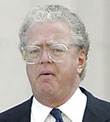| The soaring and incendiary career of San Diego class-action lawyer Bill Lerach came to an ignominious end yesterday, as a judge sentenced the onetime “King of the Shareholder Suit” to two years in federal prison. Following a 2½-hour hearing, U.S. District Judge John Walter sentenced Lerach to the maximum prison term under a plea agreement Lerach reached with prosecutors for his role in a client kickback scheme. Walter rejected Lerach's request to spend part of his sentence in home detention and rebuked Lerach for his criminal conduct, saying he had “corrupted the law firm and corrupted it in the most evil way.” Walter said he would have imposed a stiffer sentence on his own and considered rejecting the plea arrangement because of the gravity of Lerach's offense. The secret kickbacks paid by Lerach's former firm, Milberg Weiss, made it easier for the firm to be named lead counsel and to command a bigger share of settlement fees in its lawsuits against major corporations. Lerach pleaded guilty last year to a single count of conspiracy and admitted to participating in the scheme, which sought clients with large stock portfolios and asked them to serve as ready plaintiffs when negative information surfaced about a company. In return, Milberg Weiss paid these clients a percentage of the firm's legal fees. Under law, the lead plaintiff in a class-action shareholder suit must serve as a representative of the class and cannot have a special interest or hidden inducement beyond other shareholders in the case.
“In the court's view, Mr. Lerach's conduct is one of the most serious crimes to come before this court,” Walter said. “The scope and duration of this conspiracy was breathtaking.” Lerach, 61, who wore a dark suit, sat quietly with his fingers interlaced on the table in front of him. As the judge delivered his sentence, Lerach kept his eyes fixed on the table, his face flushed with color. Earlier in the hearing, Lerach addressed the judge and a courtroom packed with his supporters, apologizing for “embarrassing” his family and law firm for conduct that was “completely unacceptable in a lawyer.” “I pleaded guilty in this case because I was guilty,” Lerach said, his voice quavering. “I knew what I was doing was wrong, I just did not have the strength of will or the strength of character to not join in on what was going on in our bar.” Lerach is likely to be disbarred as a result of the conviction. After joining the Milberg Weiss law firm and moving to San Diego in 1976, Lerach became a nationwide pioneer in developing new legal strategies for shareholder litigation. His smashmouth tactics made him a pariah in corporate boardrooms, but a force to be reckoned with nonetheless. He may be known most recently as the lawyer who helped recover $7.2 billion for investors in Enron Corp. Yet Lerach also devised the strategy used to recover $240 million for investors who were bilked in the 1989 collapse of the Lincoln Savings & Loan in Irvine. He became a key strategist in similar battles waged over public bond meltdowns throughout California and Washington state, and in the sprawling case against junk bond king Michael Milken and the defunct investment firm Drexel, Burnham and Lambert. Some 160 people wrote letters of support for Lerach, including U.S. Sen. Carl Levin, D-Mich., and consumer advocate Ralph Nader. “Some of the things he did were brilliant and really advanced the cause of shareholders,” said Sean Coffey, a lawyer with New York-based Bernstein Litowitz Berger & Grossman, who often battled Lerach for the lead position in lawsuits. “On the other hand, he's a confessed criminal who really bruised, rightly or wrongly, the rest of the bar.” Lerach's attorney, John Keker, argued during yesterday's hearing that his client had stopped participating in the conspiracy in 1999. Keker said Lerach was “shocked” to learn that colleagues in New York had secretly paid a client as late as 2003 – at least two years after the government began investigating the firm. The judge rejoined that Lerach had benefited for years after he stopped actively recruiting clients to the conspiracy by collecting millions of dollars in fees from tainted cases. Walter also berated prosecutors for agreeing to a sentencing range that he felt was not severe enough, saying he had considered rejecting Lerach's plea deal and forcing the case to go to trial. “The conduct to me just goes to the core of the judicial system,” Walter said. “This whole conspiracy corrupted the law firm and corrupted it in the most evil way. He has to be punished for what he did. It comes down to retribution.” Walter noted that Lerach had not sought to lighten his sentence by agreeing to cooperate in the government's ongoing investigation of Milberg Weiss and co-founder Melvyn Weiss. Amid mounting pressure from the federal investigation, Lerach led a breakaway from Milberg Weiss and founded the San Diego law firm now known as Coughlin Stoia Geller Rudman & Robbins. He resigned from that firm in August. In addition to the prison term, Lerach agreed to forfeit $7.75 million in unlawful gains, pay a $250,000 fine and serve two years of probation. He is set to report to federal prison in California on April 21. Lerach, who somberly shook hands with supporters outside the courtroom, had no comment on the sentence. New York-based Milberg Weiss and Melvyn Weiss have been indicted as part of the same conspiracy, and have pleaded not guilty. Trial is set for August. Two former Milberg attorneys and three clients have pleaded guilty in the case. |






